
At 77, Brian Champion has lived in two worlds.
Until he was 7 or 8, he lived with his parents — Kaprun people on Kaprun land. Their ancestors lived in their country (land) for ages.
Not too long ago, DNA from a single lock of hair confirmed that Aboriginal people may be the oldest continuous culture on the planet: At least 65,000 years old.
European settlers in this region needed water, a staple so scarce that when the Golden Pipeline was put in 600 KM from Perth to Kalgoorlie, Aboriginals were tortured to have their sources revealed. That included Brian's people.
He himself was part of the "stolen generation," taken before he was 9 years old to live on a mission under government order. He was not allowed to speak his native Kaalamaya language, was schooled in living in the white world, and didn't see his parents again until he was about 14.
He says he was one of only a few Aboriginals allowed into state public school. He's not sure why. At school break, they sent him to see his family with a dollar or so to Merredin, where his parents were from.
He knew no one. He stood outside the movie theater and finally saw someone he recognized. That man knew where his parents were staying and took him there to reunite.
As an adult, Brian learned Kaalamaya again through is cousin, Clem, before he died.
Brian is the last fluent speaker of Kaalamaya — on earth.
He's now passing it on to his family so it's not lost. His nephew, James, is learning.
"I'm over the moon about that," says Brian. With language, he says, "you've got yourself back. You're somebody. You're a person and you've got an identity."
It's sort of impossible to describe the honor it is to have spent the last days with him, going to Kaalamaya sites and hearing about his life and story of his people.
There is an incredible trust he has given to me and it is a calling in my life to help tell just a fraction of his story with the hope that we can generate knowledge, and [interest in preservation](The Ngalia Foundation has been established, under the auspices of the National Trust of Australia (WA), to conserve and interpret the Indigenous heritage values of the Northeastern Goldfields region of Western Australia).
It's called the Goldfields here because the backbone industry is gold. Brian worked in a mine before 1967, when Aboriginal people finally gained Australian citizenship. Before then, they were classified as flor and fauna; he couldn't go into a bar or hotel. He needed a special license to work.
Later, he started his career on the water pipeline as a laborer in the late 1960s, and worked his way up to welder, finally being in charge of two pumping stations. He experienced racism every day; the welders wouldn't say good morning to him. A foreman saw something in him and gave him an opportunity: He succeeded. Only when he himself was a welder did they greet him.
We visited where he had welded his initials into the pipeline back then.

I asked him: What is the most important lesson you have learned in life?
"The one thing I did learn, Kristine, is the only difference between me and them is the color of my skin. I believe that I am just as capable and intelligent as the next one. Given opporutnity and a chance I can do what they are doing right alongside them — and I set out to prove that, which I did."
Ultimately, that dertermination to overcome, he thinks, comes down to a will to live.
He wishes his sons and daughters and grandkids to know that for themselves.
Brian says he doesn't need a land title or any validation now to know who he is, and know his land. He's proud of who he is and no one can take that from him.
He has taken his nephew and other young relatives out here to show them his initials, to show them that they can do such a thing too.
The "B.C." on that metal is a reminder for his kin and all Kaprun for generations: "They deserve it."
Brian is hope, and testament, that no matter how someone or something systematically eliminates or degrades or tries to make you powerless, people like Brian don't let it work.
He, his story, and his mission to keep Kaalamaya language alive should ring for ages. I'm going to shine his light bright.
"Thats what I really want," he says, "is for the world to know that we are still here."

